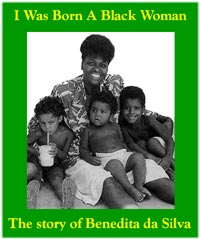 'I live in a country of 30 million impoverished people, people who can't read or write, people who live in cardboard shacks in the shantytowns, under bridges, on the streets. I know their stories because I have lived it myself.'
'I live in a country of 30 million impoverished people, people who can't read or write, people who live in cardboard shacks in the shantytowns, under bridges, on the streets. I know their stories because I have lived it myself.'
Benedita di Silva, the first Afro-Brazilian woman to be elected to Brazil's senate, is an extraordinary woman whose life reflects the struggles and the hopes of the people she represents. Bené, as she is affectionately known, was born in 1943 in one of Rio de Janeiro's notorious favelas. One of fourteen children, she led a life of excruciating poverty and hardship. Two of her four children died of curable diseases, she herself risked death after a back-street abortion went wrong, and she endured years of exploitationas a live-in maid. writes Vida Adamoli
Bené's parents, originally plantation workers in Minas Gerais, ended up living in a crowded favela after migrating to Rio in search of a better life. Her childhoos was spent hustling for money in the street, selling fruits, nuts and shoes and helping her mother wash other people's clothes. She married at sixteen and by the age of twenty-one had given birth to four children, including the two who died.
It was during this time, while raising her toddlers and working as a maid, that Bené began actively campaigning. She fought on behalf of her community for access to clean water, sewers and
electricity. At the age of forty she went back to school to complete her education, continuing on to
University and gaining a degree in social work. She joined the Workers
Party and quickly rose within its ranks. In 1982 she was elected to the
City Council of Rio de Janeiro. In 1986 she became the first black
woman ever to be elected to Brazil's Congress. In 1994 she again made
history by becoming a Senator.
Benedita is a champion of the oppressed - women, blacks,
street children, the poor. In a government
dominated by the wealthy, she is a passionate advocate for the Food
Movement and the Landless Movement. She has pushed for laws to regulate
domestic labor and worked on commissions to investigate child
prostitution, the killing of street children and the mass sterilization
of young Brazilian women. She is pioneering some of Brazil's first
affirmative action proposals to redress racial inequities in the
schools, the neighborhoods and the media. And she still lives in the same favela her family
moved to fifty five years ago.
Jesse Jackson said of her, 'Benedita's story will open up avenues of international understanding and friendship that will help keep hope alive.'
